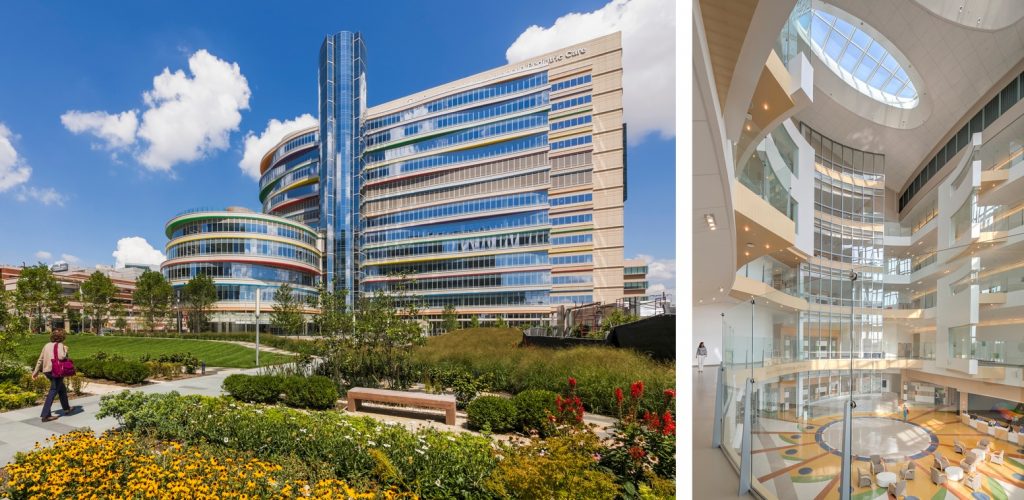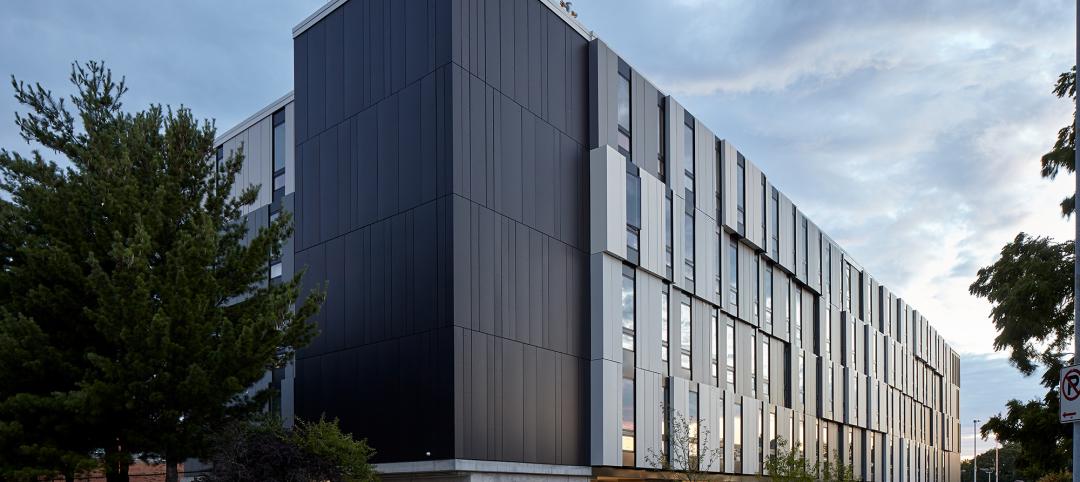In a deal announced this morning, Houston-based healthcare and S+T design specialist FKP has merged with design giant CannonDesign (#8 on BD+C’s Giants 300 Top 100 Architecture/Engineering Firms ranking). The merger forms a 19-office, 960-employee practice that produced more than $220 million in combined design revenue in 2016.
Led by CEO Diane R.K. Osan, FAIA, ACHA, FKP is an internationally recognized design firm with offices in Houston, Dallas, and Columbus. Known for its expertise in pediatric healthcare, the firm has designed children’s facilities throughout the U.S., including Nemours’ A.I. DuPont Hospital for Children in Wilmington, Del., the Children’s Hospital of Philadelphia’s Buerger Center for Advanced Pediatric Care in Philadelphia, and numerous projects for Texas Children’s Hospital.
“CannonDesign’s five-year strategic framework focuses on proactive strategies for strengthening our client partnerships through personal and firm growth by office expansions, new hires, and mergers,” said CannonDesign’s CEO Brad Lukanic, AIA, in a statement. “Today’s merger with FKP intentionally increases CannonDesign’s commitment to total health solutions with a focus on children’s health, while advancing our design impact, being a top-tier employer, and taking a stronghold in key geographic areas like Texas and Ohio.”
Reflecting on the shared benefits of the merger, Osan notes the opportunity to profoundly impact community health. “In order to effectively improve the conditions of our communities, we have to start by addressing the needs of children. Not just healthcare for children, but education, research, recreation, nutrition and that list goes on. All of these factors are critical in setting the path for a child’s future, and our firms’ combined expertise will allow us to address these factors and set children and communities up for success.”
Osan will assume the role as leader of CannonDesign’s Pediatric Health Practice. Looking beyond the traditional definition of healthcare, she will lead the practice in exploring ways to support the health and wellbeing of children across numerous environmental settings. She’ll also be joining the firm’s board of directors.
“Both of our firms have solid foundations,” added Lukanic. “Now we can expand in key areas to further serve our clients and create partnerships to evolve our design practice.”
Going forward, FKP will conduct business as FKP | CannonDesign.
Related Stories
Curtain Wall | Aug 15, 2024
7 steps to investigating curtain wall leaks
It is common for significant curtain wall leakage to involve multiple variables. Therefore, a comprehensive multi-faceted investigation is required to determine the origin of leakage, according to building enclosure consultants Richard Aeck and John A. Rudisill with Rimkus.
MFPRO+ News | Aug 14, 2024
Report outlines how Atlanta can collaborate with private sector to spur more housing construction
A report by an Urban Land Institute’s Advisory Services panel, commissioned by the city’s housing authority, Atlanta Housing (AH), offered ways the city could collaborate with developers to spur more housing construction.
Adaptive Reuse | Aug 14, 2024
KPF unveils design for repositioning of Norman Foster’s 8 Canada Square tower in London
8 Canada Square, a Norman Foster-designed office building that’s currently the global headquarters of HSBC Holdings, will have large sections of its façade removed to create landscaped terraces. The project, designed by KPF, will be the world’s largest transformation of an office tower into a sustainable mixed-use building.
Sustainability | Aug 14, 2024
World’s first TRUE Zero Waste for Construction-certified public project delivered in Calif.
The Contra Costa County Administration Building in Martinez, Calif., is the world’s first public project to achieve the zero-waste-focused TRUE Gold certification for construction. The TRUE Certification for Construction program, administered by Green Business Certification Inc. (GBCI), recognizes projects that achieve exceptional levels of waste reduction, reuse, and recycling.
Modular Building | Aug 13, 2024
Strategies for attainable housing design with modular construction
Urban, market-rate housing that lower-income workers can actually afford is one of our country’s biggest needs. For multifamily designers, this challenge presents several opportunities for creating housing that workers can afford on their salaries.
University Buildings | Aug 12, 2024
Planning for growing computer science programs
Driven by emerging AI developments and digital transformation in the business world, university computer science programs are projected to grow by nearly 15% by 2030.
Energy Efficiency | Aug 9, 2024
Artificial intelligence could help reduce energy consumption by as much as 40% by 2050
Artificial intelligence could help U.S. buildings to significantly reduce energy consumption and carbon emissions, according to a paper by researchers at the Lawrence Berkeley National Laboratory.
Sponsored | Healthcare Facilities | Aug 8, 2024
U.S. healthcare building sector trends and innovations for 2024-2025
As new medicines, treatment regimens, and clinical protocols radically alter the medical world, facilities and building environments in which they take form are similarly evolving rapidly. Innovations and trends related to products, materials, assemblies, and building systems for the U.S. healthcare building sector have opened new avenues for better care delivery. Discussions with leading healthcare architecture, engineering, and construction (AEC) firms and owners-operators offer insights into some of the most promising directions. This course is worth 1.0 AIA/HSW learning unit.
Office Buildings | Aug 8, 2024
6 design trends for the legal workplace
Law firms differ from many professional organizations in their need for private offices to meet confidentiality with clients and write and review legal documents in quiet, focused environments
Data Centers | Aug 8, 2024
Global edge data center market to cross $300 billion by 2026, says JLL
Technological megatrends, including IoT and generative AI, will require computing power to be closer to data generation and consumption, fueling growth of edge IT infrastructure, according to a new JLL report.

















